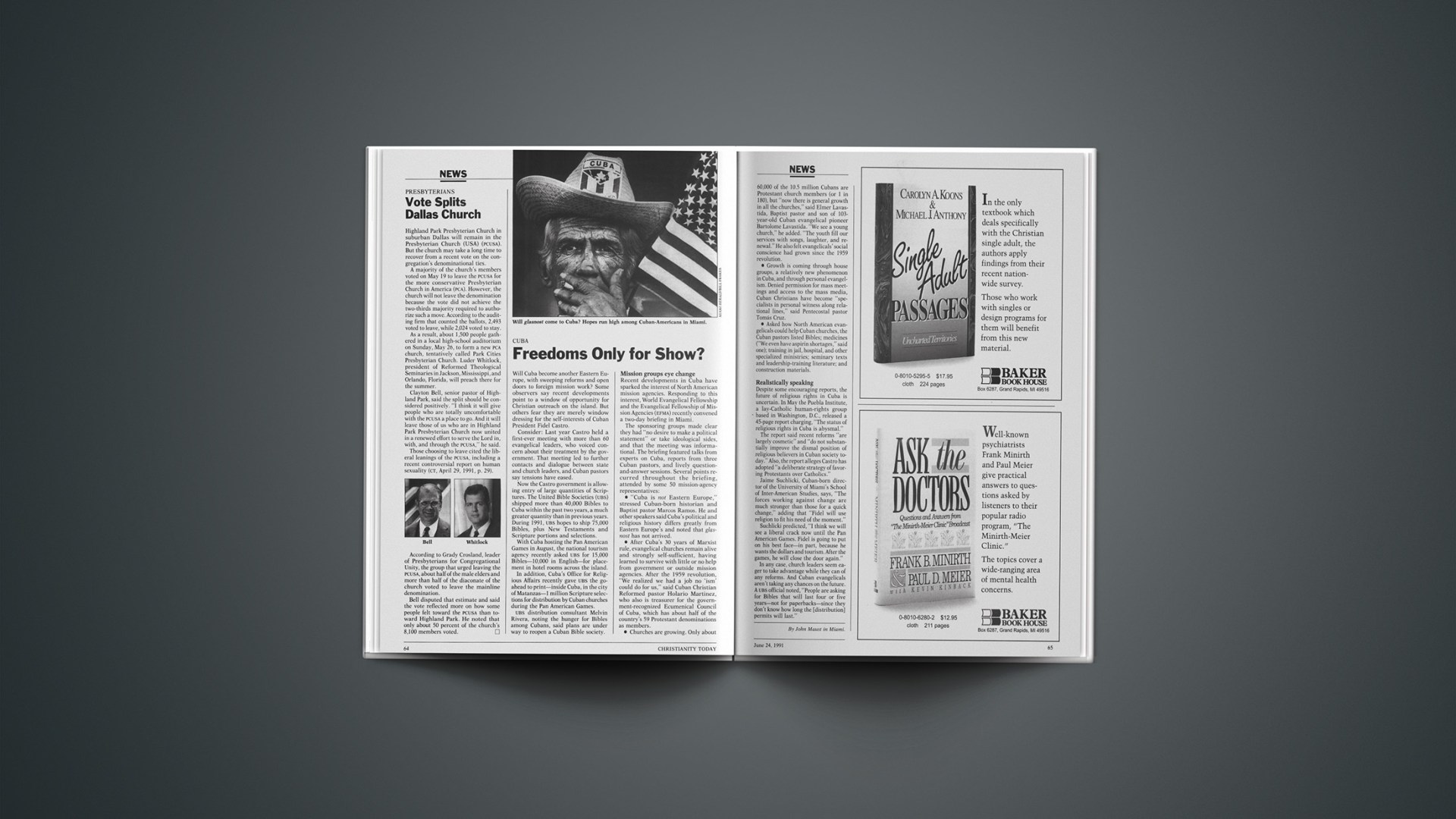Will Cuba become another Eastern Europe, with sweeping reforms and open doors to foreign mission work? Some observers say recent developments point to a window of opportunity for Christian outreach on the island. But others fear they are merely window dressing for the self-interests of Cuban President Fidel Castro.
Consider: Last year Castro held a first-ever meeting with more than 60 evangelical leaders, who voiced concern about their treatment by the government. That meeting led to further contacts and dialogue between state and church leaders, and Cuban pastors say tensions have eased.
Now the Castro government is allowing entry of large quantities of Scriptures. The United Bible Societies (UBS) shipped more than 40,000 Bibles to Cuba within the past two years, a much greater quantity than in previous years. During 1991, UBS hopes to ship 75,000 Bibles, plus New Testaments and Scripture portions and selections.
With Cuba hosting the Pan American Games in August, the national tourism agency recently asked UBS for 15,000 Bibles—10,000 in English—for placement in hotel rooms across the island.
In addition, Cuba’s Office for Religious Affairs recently gave UBS the go-ahead to print—inside Cuba, in the city of Matanzas—1 million Scripture selections for distribution by Cuban churches during the Pan American Games.
UBS distribution consultant Melvin Rivera, noting the hunger for Bibles among Cubans, said plans are under way to reopen a Cuban Bible society.
Mission Groups Eye Change
Recent developments in Cuba have sparked the interest of North American mission agencies. Responding to this interest, World Evangelical Fellowship and the Evangelical Fellowship of Mission Agencies (EFMA) recently convened a two-day briefing in Miami.
The sponsoring groups made clear they had “no desire to make a political statement” or take ideological sides, and that the meeting was informational. The briefing featured talks from experts on Cuba, reports from three Cuban pastors, and lively question-and-answer sessions. Several points recurred throughout the briefing, attended by some 50 mission-agency representatives:
• “Cuba is not Eastern Europe,” stressed Cuban-born historian and Baptist pastor Marcos Ramos. He and other speakers said Cuba’s political and religious history differs greatly from Eastern Europe’s and noted that glasnost has not arrived.
• After Cuba’s 30 years of Marxist rule, evangelical churches remain alive and strongly self-sufficient, having learned to survive with little or no help from government or outside mission agencies. After the 1959 revolution, “We realized we had a job no ‘ism’ could do for us,” said Cuban Christían Reformed pastor Holario Martinez, who also is treasurer for the government-recognized Ecumenical Council of Cuba, which has about half of the country’s 59 Protestant denominations as members.
• Churches are growing. Only about 60,000 of the 10.5 million Cubans are Protestant church members (or 1 in 180), but “now there is general growth in all the churches,” said Elmer Lavastida, Baptist pastor and son of 103-year-old Cuban evangelical pioneer Bartolome Lavastida. “We see a young church,” he added. “The youth fill our services with songs, laughter, and renewal.” He also felt evangelicals’ social conscience had grown since the 1959 revolution.
• Growth is coming through house groups, a relatively new phenomenon in Cuba, and through personal evangelism. Denied permission for mass meetings and access to the mass media, Cuban Christians have become “specialists in personal witness along relational lines,” said Pentecostal pastor Tomás Cruz.
• Asked how North American evangelicals could help Cuban churches, the Cuban pastors listed Bibles; medicines (“We even have aspirin shortages,” said one); training in jail, hospital, and other specialized ministries; seminary texts and leadership-training literature; and construction materials.
Realistically Speaking
Despite some encouraging reports, the future of religious rights in Cuba is uncertain. In May the Puebla Institute, a lay-Catholic human-rights group based in Washington, D.C., released a 45-page report charging, “The status of religious rights in Cuba is abysmal.”
The report said recent reforms “are largely cosmetic” and “do not substantially improve the dismal position of religious believers in Cuban society today.” Also, the report alleges Castro has adopted “a deliberate strategy of favoring Protestants over Catholics.”
Jaime Suchlicki, Cuban-born director of the University of Miami’s School of Inter-American Studies, says, “The forces working against change are much stronger than those for a quick change,” adding that “Fidel will use religion to fit his need of the moment.”
Suchlicki predicted, “I think we will see a liberal crack now until the Pan American Games. Fidel is going to put on his best face—in part, because he wants the dollars and tourism. After the games, he will close the door again.”
In any case, church leaders seem eager to take advantage while they can of any reforms. And Cuban evangelicals aren’t taking any chances on the future. A UBS official noted, “People are asking for Bibles that will last four or five years—not for paperbacks—since they don’t know how long the [distribution] permits will last.”
By John Maust in Miami.










